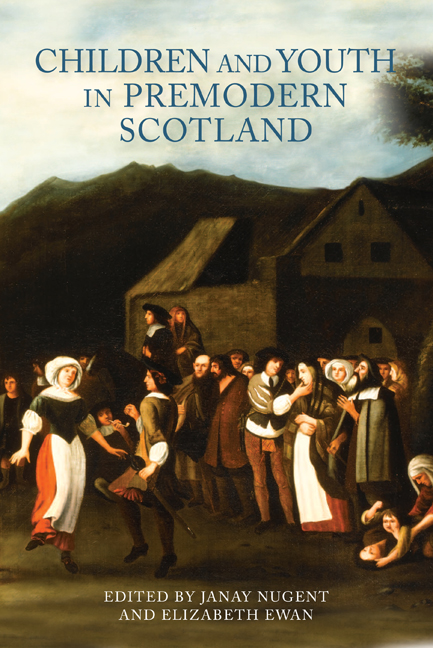Book contents
- Frontmatter
- Dedication
- Contents
- List of Illustrations
- Notes on Contributors
- Acknowledgments
- Abbreviations and Conventions
- Introduction: Adding Age and Generation as a Category of Historical Analysis
- Part I Experiences of Childhood and Youth
- Part II Representations of the Young
- Part III Constructing the Next Generation
- Envoi In Their Own Words: A Mother to Her Son
- Guide to Further Reading
- Index
- St Andrew Studies in Scottish History
11 - Sons and Daughters, ‘Young Wyfis’ and ‘Barnis’: Lyric, Gender, and the Imagining of Youth in the Maitland Manuscripts
Published online by Cambridge University Press: 11 May 2021
- Frontmatter
- Dedication
- Contents
- List of Illustrations
- Notes on Contributors
- Acknowledgments
- Abbreviations and Conventions
- Introduction: Adding Age and Generation as a Category of Historical Analysis
- Part I Experiences of Childhood and Youth
- Part II Representations of the Young
- Part III Constructing the Next Generation
- Envoi In Their Own Words: A Mother to Her Son
- Guide to Further Reading
- Index
- St Andrew Studies in Scottish History
Summary
The manuscript miscellanies associated with Sir Richard Maitland of Lethington (1496–1586) are well known as a precious resource for an understanding of the circulation, transmission, and creation of late medieval and Renaissance Scottish poetry. The two collections (Folio and Quarto) belong to what Alasdair A. MacDonald has termed ‘the great century for Scottish literary manuscripts’, raising questions about literary preservation, survival and popularity in early modern Scotland. Both volumes hold a mirror to the aesthetic, moral and political interests of a specific gentry household in an estate in East Lothian. Together they encompass a diverse and eclectic range of subjects that historically span several Stewart monarchies, and reflect religious and political sympathies allied to reformed thought. Social, political and spiritual identities and affiliations under-pin both collections, often with immediate and topical urgency, but the notion of identity also has particular roots, for these are manuscripts intimately bound up with one particular family. In terms of provenance, associations and thematic interests, familial identity, as Joanna Martin has recently demonstrated, is vital. The wealth of poems ascribed to Sir Richard Maitland himself – described as a ‘valyeant warrior wicht [strong brave warrior] / … With the pen the Poetis pairt weill playit’ – means that Folio and Quarto are a composite celebratory testament to his creative and moral vision. Poetic inscription ensures the perpetuity of the Maitland ‘lyne and linage’ (MQ, I, line 6), described in a commendatory poem by Robert Hudson as an ‘ancient raice’ (MF, CLXXXII, line 1). In the case of the Quarto, this notion of literary legacy or poetic survival becomes more poignant, given that its apparent date of compilation is the year of Maitland's death. In a very literal way, then, the manuscript is a memorial witness to Maitland and his family – ‘[h]is childaris childring’ – for in its concluding section are funerary and elegiac poems.
But the idea of family lies at the heart of these collections in other ways. This essay explores how a small but significant vein of poems imaginatively embody the relationships between parents and ‘children’. It also looks at concomitant ideas of ‘young’ feminine and masculine conduct.
- Type
- Chapter
- Information
- Children and Youth in Premodern Scotland , pp. 187 - 202Publisher: Boydell & BrewerPrint publication year: 2015



